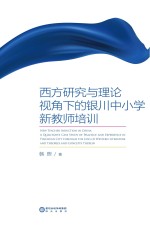图书介绍
西方研究与理论视角下的银川中小学新教师培训2025|PDF|Epub|txt|kindle电子书版本网盘下载

- 韩煦著 著
- 出版社: 阳光出版社
- ISBN:9787552532722
- 出版时间:2016
- 标注页数:398页
- 文件大小:7MB
- 文件页数:414页
- 主题词:中小学-教师培训-研究-银川
PDF下载
下载说明
西方研究与理论视角下的银川中小学新教师培训PDF格式电子书版下载
下载的文件为RAR压缩包。需要使用解压软件进行解压得到PDF格式图书。建议使用BT下载工具Free Download Manager进行下载,简称FDM(免费,没有广告,支持多平台)。本站资源全部打包为BT种子。所以需要使用专业的BT下载软件进行下载。如BitComet qBittorrent uTorrent等BT下载工具。迅雷目前由于本站不是热门资源。不推荐使用!后期资源热门了。安装了迅雷也可以迅雷进行下载!
(文件页数 要大于 标注页数,上中下等多册电子书除外)
注意:本站所有压缩包均有解压码: 点击下载压缩包解压工具
图书目录
Part Ⅰ Research Design1
Chapter 1 Introduction1
1.1.Statement of the Problems1
1.2.Purpose and Significance of the Study2
1.3.Research Questions4
1.4.Theoretical Framework for the Study6
1.5.Structure of the Thesis9
Chapter 2 Literature Review13
2.1.Introduction13
2.2.The Chinese Context14
2.2.1.Decentralization and Its Impact on Teacher Education14
2.2.2.Professionalization,Quality Education and Curriculum Reform17
2.2.3.Teacher Induction21
2.2.4.Summary24
2.3.Review of a Selection of the Western English Language Literature25
2.3.1.Overview25
2.3.2.What do New Teachers Need?-Maslow's Hierarchy of Needs27
2.3.3.What if the needs are not met?39
2.4.What Can Be Done to Help New Teachers?41
2.4.1.What is Induction and Why Induction?41
2.4.2.Comprehensive Approaches to Induction44
2.5.Emerging Themes50
2.5.1.Teacher Identity50
2.5.2.Professional Identity as Contextual,Relational and Emotional53
2.5.3.The Awareness of the Professional Identity56
2.5.4.The Narrative Constitution of identity57
2.6.Summary58
Chapter 3 Methodology,Research Design,and Methods62
3.1.Overview:an Interpretive Case Study62
3.2.Method of Inquiry:A Narrative Approach63
3.3.Combining Narrative Interviews with Topical Interviews:Developing a Frame-work for Interviews67
3.3.1.Overview67
3.3.2.The Narrative Interview69
3.3.3.The Topical Interview72
3.3.4.Combining the Two Approaches73
3.4.Participants and Data Collection Process74
3.4.1.Initial Planning of Participants Selection and Data Collection74
3.4.2.Phase One Data Collection and Some Reflections76
3.4.3.Overview of Data Collection Process80
3.5.Data Analytical Approach:a Voice-centred Relational Approach82
3.5.1.Overview82
3.5.2.A voice-centred relational method of data analysis(VCR)83
3.5.3.Summary97
3.6.Reliability,Validity and Generalisability98
3.7.Ethical Considerations100
3.8.Summary101
Part Ⅱ Analysis and Discussion of Findings103
Chapter 4 Induction Programme103
4.1.Overview103
4.2.Induction Policy Directives and Programme Arrangement104
4.2.1.An Overview of the System in Yinchuan104
4.2.2.Context105
4.2.3.Induction Policy Directives106
4.2.4.Induction Programme Emphases and Implementation109
4.2.5.Teacher Assessment121
4.2.6.Evaluation125
4.3.Beginning teachers'expectations about and attitudes towards induction126
4.3.1.Support Expected by New Teachers127
4.3.2.Common Induction strategies experienced by new teachers137
4.4.Summary and Discussion:Characteristics of Secondary School Induction Arrangement in Yinchuan-a Culture of Mentoring148
Chapter 5 Job Motivation155
5.1.Overview155
5.2.Entry into the Profession158
5.2.1.Entry into the ITT Programme158
5.2.2.Entry into Teaching160
5.2.3.Summary163
5.3.Beginning Teaching165
5.3.1.Working with Children168
5.3.2.Working with Colleagues176
5.3.3.Conflict with Individual Principles179
5.3.4.Responsibilities,Workload and Recognition186
5.3.5.Employment Status and Career Directions192
5.4.Summary and Discussion196
Chapter 6 Self-Image200
6.1.Overview200
6.2.Beginning Teachers'Self-Images205
6.2.1.Early Experiences205
6.2.2.Qualification and Employment Status214
6.2.3.Professional Relationship with Students221
6.2.4.Professional Relationships with Mentors and Colleagues229
6.2.5.School and Academic Subjects240
6.3.Summary and Discussion245
Chapter 7 Subjective Educational Theory250
7.1.Overview250
7.2.Beginning Teachers'Subjective Educational Theories257
7.2.1.Being a Learner and Conception of Professional Learning257
7.2.2.Routines and Practical Knowledge266
7.2.3.Pedagogical Perspectives273
7.3.Summary and Discussion282
Part Ⅲ Conclusion292
Chapter 8 Conclusion292
8.1.Overview292
8.2.Answers to Research Questions293
8.2.1.Beginning Teacher Induction in Yinchuan City293
8.2.2.The First Year of Teaching296
8.2.3.Summary302
8.3.Limitations to This Research304
8.4.Implications306
8.4.1.Implications for Teacher Education and Induction307
8.4.2.Implications for Future Research on New Teacher Induction309
8.5.A Final Word311
References313
List of Tables53
Table 2.1:Four Ways to View Identity53
Table 3.1:Data Collection Process81
Table 3.2:Story One88
Table 3.3:Story Two88
Table 4.1:Stage of Teacher Development106
Table 4.2:Stages of Teacher Development108
Table 4.3:Content of Induction Programme Curricula111
Table 4.4:School A New Teacher Professional Development Plan120
Appendices348
Appendix 1:Short Explanations for Terms in Chinese348
Appendix 2:Models of pre-service teacher preparation350
Appendix 3:Six goals of the new curriculum reform351
Appendix 4:Induction Support for new teachers in Shanghai352
Appendix 5:Key Features of Limited versus Comprehensive Induction Programmes354
Appendix 6:Interview Schedule355
Appendix 7:Participants366
Appendix 8:Consent Form371
Appendix 9:The Life Story Method374
Appendix 10:A sample of Pronouns Used by Mr.Fu390
Appendix 11:School D Classroom Teaching Assessment Standard(2009-2010)394
Appendix 12:Student-oriented Classroom Teaching Assessment Form397
Appendix 13:Ningxia Secondary School Teachers Basic Teaching Qualities and Skills Test Form and Rating standard398